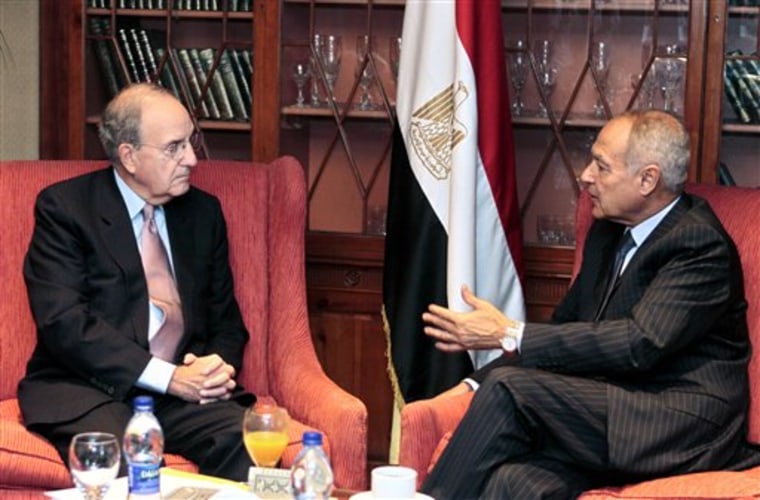Washington's special Mideast envoy wrapped up his latest round of shuttle diplomacy in the region on Sunday, again having failed to persuade the Israelis and Palestinians to resume peace talks.
The envoy, George Mitchell, spent more than an hour huddling with Israel's prime minister and defense minister. Prime Minister Benjamin Netanyahu's office said the talks "continued their discussions on moving the peace process forward."
Two lower-level Israeli officials will head to Washington this week for further discussions, it added. Mitchell did not comment publicly after the meeting and was returning to Washington, U.S. officials said.
Mitchell, a former U.S. senator and mediator of Northern Ireland's peace deal, has been shuttling between Israeli and Palestinian officials for months, trying to restart negotiations that broke down late last year.
Mitchell met with Netanyahu and Palestinian President Mahmoud Abbas late last week before traveling to Cairo over the weekend to meet with Egyptian officials, who often play leading roles in mediating the conflict.
Little progress
Even with the Nobel Peace Prize awarded to his boss, Mitchell appeared to have made little progress in persuading the adversaries to soften their positions.
Israel has refused to give in to U.S. pressure to freeze construction in Jewish settlements built in the West Bank and east Jerusalem.
The Palestinians, who claim both areas as parts of a future independent state, say they won't resume talks without a settlement freeze. They also want guarantees that an Israeli pullout from the West Bank and east Jerusalem will be the basis of a final agreement. Israel captured both areas in the 1967 Mideast war.
"The Israelis need to acknowledge that the 1967 borders are the borders between the two states, and this is the foundation of any negotiations," said Yasser Abed Rabbo, a top Abbas aide.
Netanyahu has signaled he wants to keep parts of the West Bank and says east Jerusalem will remain in Israeli hands.
Abbas will be hard-pressed to back down after provoking unprecedented outrage among his people for suspending efforts to bring Israel before a U.N. war crimes tribunal for its conduct during last winter's war in the Gaza Strip.
President Barack Obama made a personal push last month to jump start the stalled talks with a three-way meeting with Netanyahu and Abbas in New York.
The U.S. president was awarded the Nobel Peace Prize on Friday for his initiatives to reduce nuclear arms, ease tensions with the Muslim world and stress diplomacy and cooperation rather than unilateralism.
Deep divide
Complicating the U.S. peace mission is the deep divide between rival Palestinian governments in the West Bank and Gaza Strip. The Palestinians seek to build a state that includes both territories, located on opposite sides of Israel.
Egypt has been trying to broker a power-sharing deal between Abbas' government in the West Bank and the Hamas rulers in Gaza. Hamas seized control of Gaza after ousting pro-Abbas forces in 2007.
A reconciliation deal was to have been signed on Oct. 25, but Egyptian Foreign Minister Ahmed Aboul Gheit said Sunday that the elusive agreement has been delayed for several weeks. The accord was to have allowed the two sides to cooperate in rebuilding war-ravaged Gaza and prepare for Palestinian elections next year.
Hamas said on its Web site that it was postponing the agreement because of Abbas' decision to delay action on the U.N. report condemning Israeli attacks during the Gaza war.
A U.N. panel led by veteran war crimes prosecutor Richard Goldstone accused Israel of using disproportionate force and deliberately targeting civilians during its winter assault on Gaza. It also called Hamas' firing of rockets at civilian areas in southern Israel a war crime.
Both sides have denied war crimes allegations.
